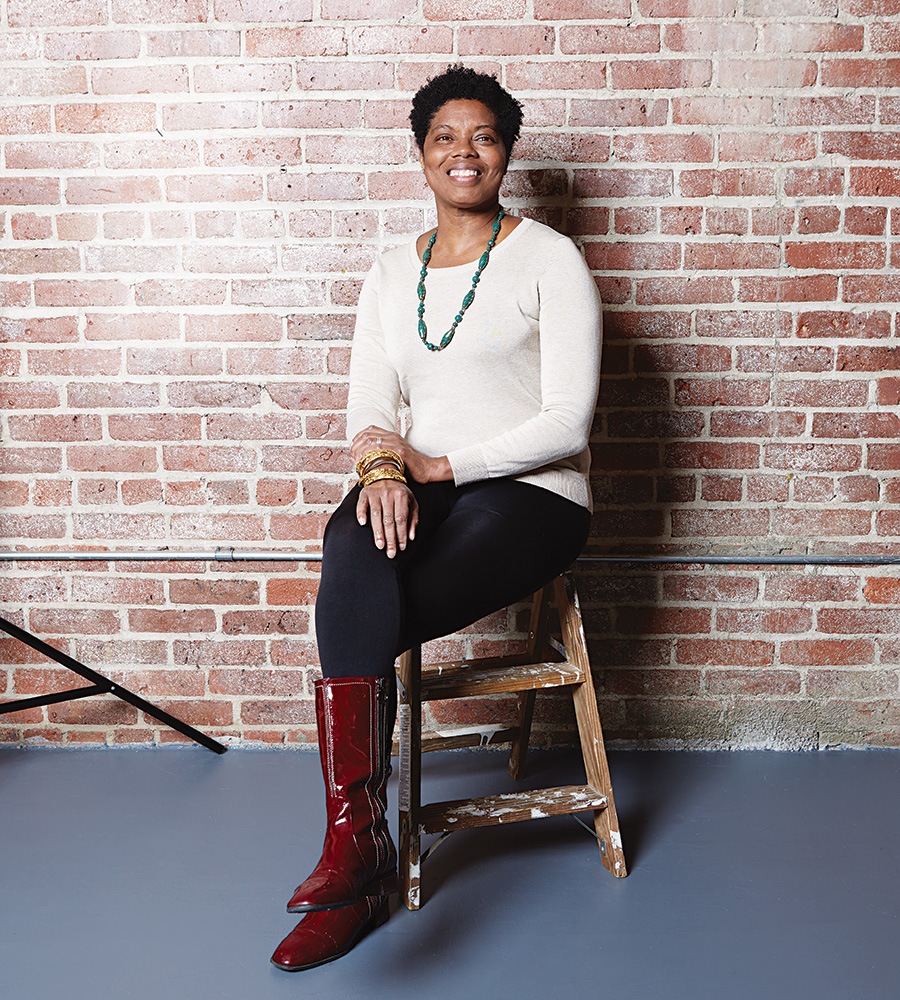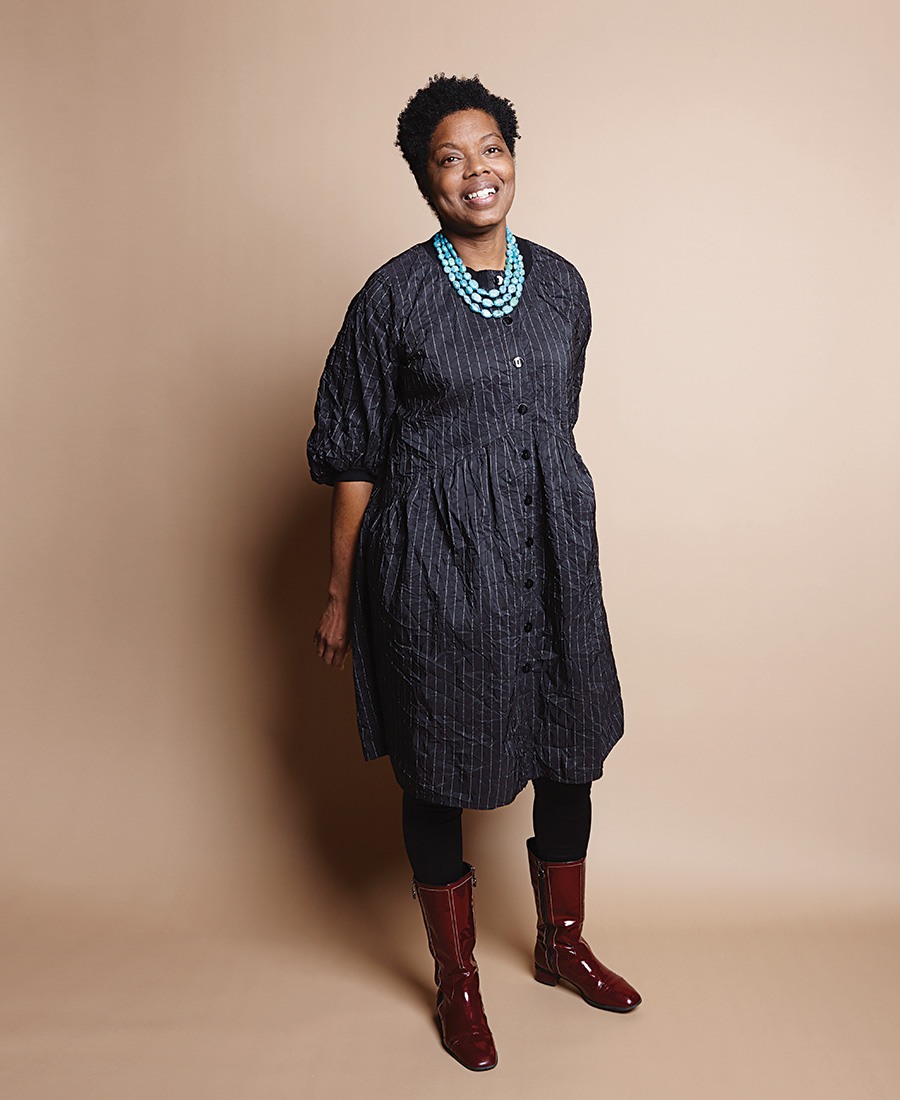The Interview: Black Economic Council of Massachusetts Head Nicole Obi
The former Fidelity VP on how Boston can level the playing field for entrepreneurs, the city's racist reputation, and her time at MIT’s Sloan School of Management.

Photo by Mona Miri
Armed with a pair of degrees from MIT’s Sloan School of Management, Nicole Obi burst onto Boston’s business scene as a serial entrepreneur, founding and cofounding two successful startups and launching her own consulting firm before landing at Fidelity for nearly a dozen years, including time as a VP. Then, a couple of months after COVID struck, she took the helm of the Black Economic Council of Massachusetts (BECMA), seeing Black-owned business owners through the depredations of the pandemic and helping her constituents navigate the economic implications of the ensuing racial awakening. We sat down with the Brookline resident and proud mother to talk about what’s next for the business community.
Have you always been entrepreneurial?
Ever since I was a kid, I’ve just always been looking for opportunities. That’s sort of my favorite word. And being kind of a jack-of-all-trades, I’m happy to pull what I’ve learned from one area into another. I think it’s why I enjoy what I’m doing now. I don’t have a background in policy or running a nonprofit. But I can draw from my own experiences, both in management and as a citizen, and kind of pull it all together.
What was your first entrepreneurial venture?
When I was very young, the Boston Globe was looking for a paper boy or girl, and I didn’t get picked. But the girl who did decided a few weeks into it that it wasn’t for her. I bought her out, and I took over her route. And that was the beginning of my entrepreneurial journey.
When you sold your first tech startup, did you make a killing, like “now I never have to work a day in my life”?
I had two venture-backed startups, and I walked away with the ability to make decisions about what was next for me. I wouldn’t call it a killing. But it gave me options. There was one venture capitalist who gave me a chance, and it really did change the trajectory of my life.
Do you think Boston deserves its reputation as a racist city?
I do. I think the city has demonstrated that it’s been unfriendly to Black and brown people, and it deserves that brand, but I also want to make sure that we’re emphasizing and highlighting all that has been done over the years to address that. I also think it’s really important that we don’t dwell on the past while recognizing that there’s a reality around that perception, even if it’s getting better.
What are the initiatives or policy changes that are driving that progress?
The work that’s been done by organizations that have been around a long time with respect to DEI, like the partnerships with organizations such as Boston While Black. They’re helping to make people of color feel more welcome here. And I know that since the racial reckoning around George Floyd, many allies have been quite engaged in hiring into DEI roles and taking other actions that are definitely needed to address those problems.
Do you think the awakening that came after George Floyd’s murder has created lasting change?
I do believe that it’s created change. You know, for some, it was sort of a moment, and that moment is gone. You’ll notice that a lot of the Black Lives Matter signs are gone. But for others, I think they’re on a journey now, and their level of awareness and willingness to act has begun and will continue. Engaging those allies who are genuinely interested in bringing about this change is where the work lies right now.
There’s been a lot written about “Black flight,” or the “reverse great migration,” with many young Black professionals moving to cities in the South. Northern liberals might find it counterintuitive that they would feel more comfortable there. Any thoughts?
Well, I’m not only concerned about Black flight, but to be honest, about this drain happening across our young professional communities because Massachusetts is so expensive to live in. Many of our young folks are, I’m afraid, not staying here and going instead to other cities, with more opportunity for them to have a lifestyle they can’t aff ord here, either because of housing prices, transportation issues, or cost of living. That’s not an issue that’s unique to the Black community, but it’s maybe more acute in the Black community.
Not to generalize, but can you paint a thumbnail sketch of Black-owned businesses in Massachusetts?
Most of Massachusetts’ Blackowned businesses are on the smaller scale, but they’re very broad in terms of the areas they represent. They’re retailers, restaurants, service providers, daycare centers; you name it.
Are there specific industries where you’d like to see Black ownership increase?
Yes, the high-growth industries such as life sciences, construction, climate resiliency, financial services. Part of BECMA’s focus is on moving more of the community we serve into those spaces. If you’re a Black accountant, you can be an accountant in the life sciences space. We want to help existing business owners shift into these industries and to support the launch of new Black-owned businesses within these industries, as well.
Is there a businessperson you most admire?
Oh, a lot of diff erent people. I wouldn’t be able to name just one person. It’s sort of an amalgamation of people like Madam C.J. Walker [credited as the first female self-made millionaire in America] and other people who overcame obstacles not only to become successful but also to give back. I think that’s what makes a really interesting entrepreneur.
What are some of your favorite Black-owned retailers, restaurants, or businesses?
You’re gonna get me in trouble here. I have a lot, but everybody knows that I love Chef Dave’s in Chestnut Hill. I also support Black Owned Bos. [an online guide to Black-owned businesses]. I love the work that Jae’da Turner is doing to promote small businesses, incubating them as new retailers with storefronts. But really, we have hundreds and hundreds of Black-owned businesses, and I support as many of them as I can.

Photo by Mona Miri
What was it like to be a Black woman in an environment like MIT’s Sloan School of Management?
Well, I was one of the few Black people in my class at MIT, and that was challenging, just because we didn’t have a big community, but the community that we had was pretty tight. I ended up marrying one of my classmates. But in going to MIT, what it did was provide a lot of opportunities for me. One of the main things that we do in our work at BECMA is helping to get equitable opportunities for more of the Black community, so they can enjoy the types of experiences I’ve had.
Are you focusing particularly on Black women?
We’re not specifically focused on women, but the majority of Black-owned businesses are owned by women. Especially the newer businesses. So in that sense? Yes.
What do you attribute that gender disparity to?
I’m not sure. I don’t have a good answer for that. But it’s not something that’s specific to Massachusetts. It’s something that the data shows happening nationwide.
If a young person were to come to you looking to start a business in Boston, what advice would you give them?
I would say to build your community of support. Ask for help. I think that’s something that we as a people can do better at, rejecting this idea of going it alone. There’s an African proverb: “If you want to go fast, go alone, but if you want to go far, go together.”
Is there any one thing you can pinpoint, concretely or even symbolically, that is making Massachusetts more welcoming to Black business owners?
Yes. Over the past couple of years, there has been a myriad of equity laws passed. I’m very focused on laws because they’re something that we can hold folks accountable to. Most recently, former Attorney General [now Governor] Maura Healey brought charges against Polar Park, Worcester’s baseball stadium, for false claims and consumer protection law violations regarding minority-owned subcontracting. Corporations are also making commitments to diversity, equity, and inclusion, but they also need to make sure they’re actually complying. The first step was putting the rules in place. Now it’s about enforcing them.
What episode of Black history do you wish you had witnessed firsthand?
You know, I’m excited for this moment that we’re in right now. We’re at this point of racial awakening, and a lot of people might not be comfortable with it, but they get it. I love that there’s an unprecedented amount of capital available to address major crises facing not just the Black community but all of us, whether it’s economic, environmental, health, or even the risk to our democracy itself. So being in this moment makes me really excited to be part of the solution and to create a more equitable future for Massachusetts.
Do you think financial literacy should be taught in public schools?
Absolutely. And it’s not. I’m old enough to remember home economics, and we covered a lot of the basics of financial literacy. It was very practical. I think now we wait way too long to teach our children financial literacy, and for many, it puts them at a disadvantage very early in their lives. It’s hard to recover from that.
What do you think is the single most important quality in an entrepreneur?
I’m torn between tenacity, because you’re going to hear “no” a lot, and being confident and believing in yourself.
Who’s the person you most admire, living or dead?
I’ve always admired Martin Luther King Jr., but now that I’m in the role that I am, I have a different perspective on his work, and I’m discovering him anew. I find that he’s so much more than I understood him to be. So it’s a rediscovery.
The pandemic generally hit Black and Hispanic communities much harder than it did other populations. Did it similarly aff ect the members of BECMA and Black-owned businesses in the state?
The Black community was disproportionately affected by COVID. For Black business owners whom we recently surveyed, 43 percent of them said that they got less than $50,000 in COVID relief funding, and 33 percent of them got absolutely nothing. And those are the business owners who are still around today. Many, many more didn’t make it to take that survey. So that crisis laid bare where we were falling down and how the relief funding was distributed inequitably. We have a lot of work to do. And now the problems are compounded by inflation and a labor shortage, which everybody is facing, but our business owners still don’t have adequate access to the capital they need to grow, which is unfortunate because small businesses—Black, white, whoever— are the backbone of our economy.
What’s the best book on entrepreneurship that you’ve ever read?
I learn things from all sorts of diff erent sources, there’s usually not just one thing or one person. Just the other day, I was listening to Trevor Noah’s Born a Crime. I was drawing things from his experience and how he adapted and adjusted to growing up in postapartheid South Africa. But there’s not one single book I can name.
Can entrepreneurship be taught?
It can be nurtured. Entrepreneurship is not for everyone. But just like any other subject in school, students should be exposed to it, and for those who are interested in it, that should be encouraged.

Photo by Aleksandr Zubkov/Getty Images
By the Numbers
Strictly Business
Five stats to know about Black-owned Boston.
21
Percentage of wines sold at Black-owned Urban Grape in 2022 that were BIPOC-produced or -owned.
75,611,498
Total 2021 revenue, in dollars, of Westnet, a Blackowned distributor of medical, surgical, and laboratory supplies based in Canton.
3
Number of generations that have owned and run Cruz Companies, a real estate development, construction, and management company that raked in close to $53 million in revenue in 2021.
132
Jobs posted at presstime on the website of the multimillion-dollar human capital firm the Panther Group.
3,000
Number of titles on the shelf of Frugal Bookstore, Boston’s only Black-owned bookstore, which opened in Roxbury in 2008.
First published in the print version of the March 2023 issue with the headline, “The Game Changer.”
Previously
- The Interview: Novelist Hank Phillippi Ryan
- The Interview: GBH President and CEO Susan Goldberg
- The Interview: MIT President Sally Kornbluth
- The Interview: Boston Public Schools Superintendent Mary Skipper
- The Interview: Boston Public Library President David Leonard
- The Interview: CNN Anchor and Correspondent Audie Cornish
- The Interview: Joey McIntyre of New Kids on the Block


